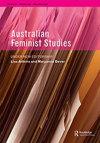标签里有什么?描绘澳大利亚校园性侵犯活动与#MeToo之间的脱节
IF 1.5
4区 社会学
Q2 WOMENS STUDIES
引用次数: 2
摘要
2017年,#MeToo标签在美国广泛传播之后,又在澳大利亚引起了人们对性骚扰问题的关注。然而,早在#MeToo运动席卷全球之前,大学校园里的女权主义活动人士就已经在强调性暴力在他们所在社区的普遍存在。在澳大利亚,这些对话是在不同的领域进行的,相对而言,很少有学生活动人士在他们的活动中高举#MeToo的旗帜。尽管如此,#MeToo的叙事仍然被追溯地映射到媒体和公共话语中的学生性侵犯活动中。本文通过对学生女权主义活动家的第一手研究,考虑了澳大利亚校园性侵犯运动和“#MeToo时刻”之间的脱节。它探讨了澳大利亚所谓的“#MeToo时刻”的种族和阶级政治,并批评了反对性暴力的各种女权运动被纳入“#MeToo”主要叙事的方式。我认为,要使这些运动具有变革潜力,就需要性暴力活动人士参与反殖民和反资本主义的斗争,超越“我也是”(#MeToo)所设定的狭隘视野。本文章由计算机程序翻译,如有差异,请以英文原文为准。
What’s in a Hashtag? Mapping the Disjunct Between Australian Campus Sexual Assault Activism and #MeToo
ABSTRACT In 2017, the #MeToo hashtag drew focus to the issue of sexual harassment in Australia, following its widespread reach in the United States. However, long before #MeToo made waves around the globe, feminist activists on university campuses were highlighting the prevalence of sexual violence in their communities. These dialogues in Australia have proceeded on somewhat separate terrains, with relatively few student activists taking up the #MeToo banner in their campaigns. Nonetheless, the narrative of #MeToo continues to be retrospectively mapped onto student sexual assault activism in the media and public discourse. This paper considers the disjunct between the campus sexual assault movement and the ‘#MeToo moment’ in Australia through first-hand research conducted with student feminist activists. It explores the racial and class politics of the so-called ‘#MeToo moment’ in Australia, and critiques the way in which diverse feminist movements against sexual violence have been subsumed under the master narrative of #MeToo. For these movements to have transformative potential, I suggest, requires sexual violence activists to engage with anti-colonial and anti-capitalist struggles, beyond the narrow vision posited by #MeToo.
求助全文
通过发布文献求助,成功后即可免费获取论文全文。
去求助
来源期刊

Australian Feminist Studies
WOMENS STUDIES-
CiteScore
2.50
自引率
0.00%
发文量
7
期刊介绍:
Australian Feminist Studies was launched in the summer of 1985 by the Research Centre for Women"s Studies at the University of Adelaide. During the subsequent two decades it has become a leading journal of feminist studies. As an international, peer-reviewed journal, Australian Feminist Studies is proud to sustain a clear political commitment to feminist teaching, research and scholarship. The journal publishes articles of the highest calibre from all around the world, that contribute to current developments and issues across a spectrum of feminisms.
 求助内容:
求助内容: 应助结果提醒方式:
应助结果提醒方式:


